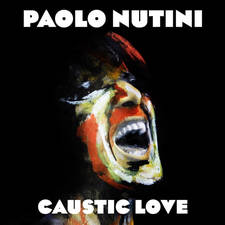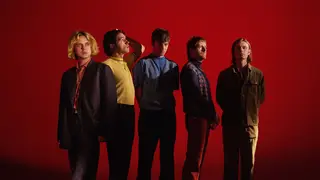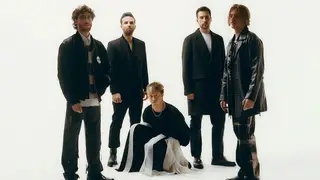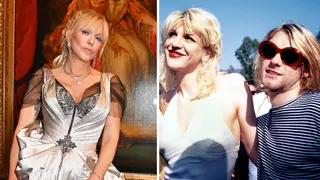Notting Hill Carnival 2021: Is this year's event going ahead?
23 August 2021, 10:10 | Updated: 23 August 2021, 10:12
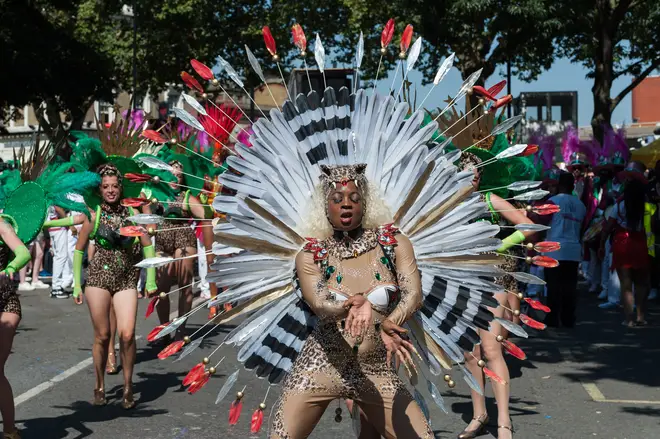
The organisers of the historic event released a statement about the festival this year. Find out if it is cancelled and how you can celebrate.
Notting Hill Carnival is a huge London event that celebrates Afro-Caribbean culture and is part of London's DNA.
The annual event, which usually sees two million-strong revellers take to the streets of Notting Hill and Kensington over the August Bank Holiday weekend, was sadly forced to cancel in 2020 due to the COVID-19 pandemic.
Although England's restrictions have mostly been lifted, was the carnival forced to cancel once again?
Find out everything we know so far about the event, including when it takes place, if its 2021 instalment is cancelled and how else you can celebrate this year.
READ MORE: Which festivals are going ahead in 2021
When is Notting Hill Carnival?
Notting Hill Carnival traditionally takes place annually on August Bank Holiday weekend. This year's instalment would fall from 29-30 August 2021.
Some believe it is a three day festival, but the parades themselves are technically only two days. There is a UK National Panorama Steelband Competition on Saturday evening but the Caribbean carnival officially starts on Sunday, which is known as Children's Day or Family Day.
Is this year's Notting Hill Carnival cancelled?
Yes, unfortunately Notting Hill Carnival's parade has been cancelled in 2021, which makes it the second year running. The board of The Notting Hill Carnival said it would "not be on the streets due to the ongoing uncertainty and risk COVID-19 poses."
They wrote in an official statement: "After lengthy consultations with our strategic partners, our Advisory Council and individual participating bands and sound systems, the board of Notting Hill Carnival Ltd, the organising body of Notting Hill Carnival, has decided that this year's Carnival will not be on the streets due to the ongoing uncertainty and risk COVID-19 poses.
"This has been an incredibly difficult decision to make. Everyone involved in the event desperately wants a return to the road where Carnival belongs but safety has to come first and with the latest cautious announcement on the government’s ‘roadmap’, this is the only way to ensure that.
"In making this decision, we have considered our responsibilities to deliver a safe, spectacular, successful and sustainable Carnival. The conclusion is that with so much uncertainty, with time short for Carnivalists to prepare and the risk of eventual cancellation a real possibility, we must refocus our efforts for 2021."
They concluded: "Going forward, we will be working with Carnivalists toward the greatest ever Notting Hill Carnival for 2022."
How can I get involved?
Although Notting Hill Carnival 2021's street parades will not take place, the board confirmed they will be planning "alternate events that will allow everyone to safely celebrate everything Notting Hill Carnival stands for. "
They add: "More details on all of this, as well as special events leading into the August bank holiday weekend will be announced in due course."
Visit www.nhcarnival.org for more info.
What's the history of the event?
The first Notting Hill Carnival has its roots back in 1959 when it was held indoors as a celebration for Britain's Afro-Caribbean community. However, the street parades first began in 1966.
Notting Hill Carnival's roots are known for having two separate but connecting strands. In 1959 a "Caribbean Carnival" was held on 30 January 1959 in St Pancras Town Hall as a response to the state of race relations in the UK at the time. The event, which was held indoors and televised by the BBS, was organised by Trinidadian journalist Claudia Jones, who is often referred to as "the mother of Notting Hill Carnival".
The second strand was a more hippie, London Free School-inspired, Notting Hill-based event whose prime figure was Rhaune Laslett. The event, which aimed to promote cultural unity was the first outdoor organised event. A street party for neighbourhood children turned into a carnival procession when Russell Henderson's steel band (who had played at the earlier Claudia Jones events) went on a walkabout.
Around two and a half million people annually across the two days - making it one of the largest street festivals in the world. It takes place on the last weekend of August, falling on the Bank Holiday Monday and the Sunday before.
READ MORE: Which small and boutique festivals will be going ahead in 2021?
